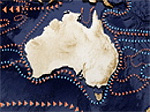Search
Democracy Links
Member's Off-site Blogs
washed-out .....

An expert science review panel recommended CSIRO boost support for oceanographer Trevor McDougall's globally significant climate research, just months before Australia's peak science agency dumped the award-winning scientist, documents reveal.
Two internal reports, obtained by The Canberra Times, show CSIRO also rejected the panel's recommendation the agency appoint a science advisory committee to clear up confusion over ''science vision at a higher level'' among executives responsible for running its marine and atmospheric research division.
DOCUMENTS: Read the expert review and the CSIRO response
The documents show an independent performance review panel - which included Professor Chet Koblinsky, head of climate programs for the National Oceanic and Atmospheric Administration in the United States - praised Dr McDougall's research as impressive and world-renowned. His research had made important contributions to understanding ''world ocean circulation and its chemistry'', and had helped make CSIRO a world leader in this area, the report said.
But CSIRO said it was ''unlikely'' to increase funding for Dr McDougall's area of ''fundamental research'' and suggested there was already ''a slight imbalance'' to be rectified.
Sources at CSIRO told The Canberra Times there was ''one research scientist working in that area, and that was Dr McDougall, so if there was an imbalance, it was a case of one being one too many''.
Dr McDougall, who is regarded as one of the world's leading climate researchers, was made redundant by CSIRO last year, less than six months after receiving the peer-nominated Prince Albert medal for ocean research - his seventh major science award. He received the medal for recent research on ocean thermodynamics, which created new world standards for measuring the properties of seawater.
Last month, more than 160 of the world's top oceans and climate scientists signed a letter emailed to CSIRO chief executive Megan Clark, protesting at Dr McDougall's dismissal. The letter accused CSIRO of ''relinquishing its responsibility'' to global climate science, and abandoning ''high-impact research''.
Dr Clark did not reply, but The Canberra Times has obtained a copy of a letter sent to the group's co-ordinator, Professor Carsten Eden in Germany, by CSIRO's environment executive Andrew Johnson.
In a one-page reply, Dr Johnson defends the agency's decision ''to cease support'' for Dr McDougall's research as arising from CSIRO's changing research priorities
''I can assure you that it was not taken lightly, or without regard for Dr McDougall's outstanding science,'' he wrote.
Dr Johnson said CSIRO had discussed ''alternative pathways for [Dr McDougall's] work to continue in an organisation whose mission more closely aligns with his aspirations''. He said the expert panel's report suggested there was a risk of the division's research ''being spread too thin''.
It had also recommended it ''focus on a smaller number of areas in which to further develop the depth of research necessary to lead in the future''. But according to the panel's report, one of those areas was Dr McDougall's ''fundamental research'' into ocean climate and chemistry.
It states, ''fundamental research is needed to understand circulation processes from the surface to the ocean bottom'' and warns it is ''absolutely crucial'' existing research be maintained and expanded.
The independent review of the Hobart division involved a team of six experts, flying to Hobart for a week of research presentations and assessments. The experts were Professor Andy Rosenberg, Professor Ron Prinn and Professor Koblinsky, of the US, Professor Jan de Leeuw, of the Netherlands and Australian scientists, Professor Dave Griggs and John Manners.
Their report also said the division's management structure was confusing to external clients.
- By John Richardson at 13 Feb 2012 - 10:09am
- John Richardson's blog
- Login or register to post comments
Recent comments
1 hour 6 min ago
2 hours 10 min ago
6 hours 36 min ago
6 hours 40 min ago
1 day 1 hour ago
1 day 4 hours ago
1 day 4 hours ago
1 day 7 hours ago
1 day 9 hours ago
1 day 14 hours ago